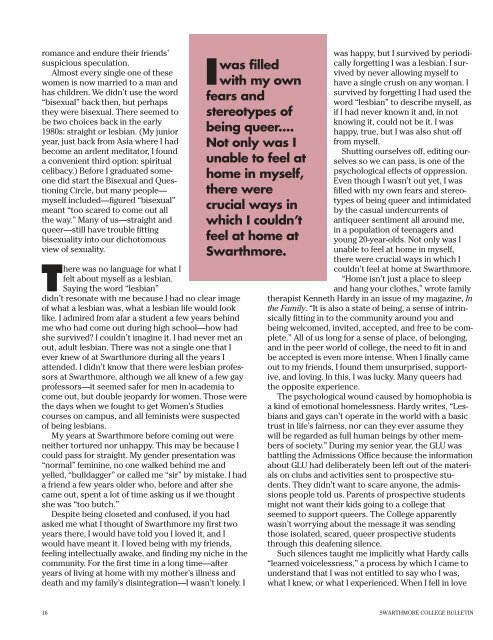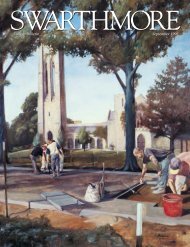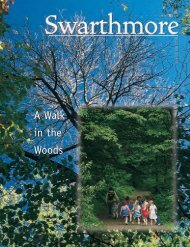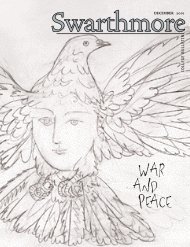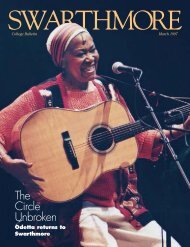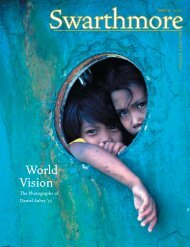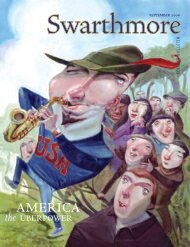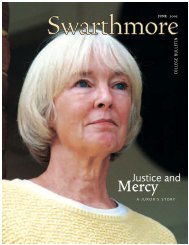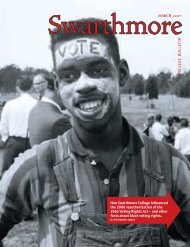Swarthmore College Bulletin (June 1998) - ITS
Swarthmore College Bulletin (June 1998) - ITS
Swarthmore College Bulletin (June 1998) - ITS
- No tags were found...
You also want an ePaper? Increase the reach of your titles
YUMPU automatically turns print PDFs into web optimized ePapers that Google loves.
omance and endure their friends’suspicious speculation.Almost every single one of thesewomen is now married to a man andhas children. We didn’t use the word“bisexual” back then, but perhapsthey were bisexual. There seemed tobe two choices back in the early1980s: straight or lesbian. (My junioryear, just back from Asia where I hadbecome an ardent meditator, I founda convenient third option: spiritualcelibacy.) Before I graduated someonedid start the Bisexual and QuestioningCircle, but many people—myself included—figured “bisexual”meant “too scared to come out allthe way.” Many of us—straight andqueer—still have trouble fittingbisexuality into our dichotomousview of sexuality.There was no language for what Ifelt about myself as a lesbian.Saying the word “lesbian”didn’t resonate with me because I had no clear imageof what a lesbian was, what a lesbian life would looklike. I admired from afar a student a few years behindme who had come out during high school—how hadshe survived? I couldn’t imagine it. I had never met anout, adult lesbian. There was not a single one that Iever knew of at <strong>Swarthmore</strong> during all the years Iattended. I didn’t know that there were lesbian professorsat <strong>Swarthmore</strong>, although we all knew of a few gayprofessors—it seemed safer for men in academia tocome out, but double jeopardy for women. Those werethe days when we fought to get Women’s Studiescourses on campus, and all feminists were suspectedof being lesbians.My years at <strong>Swarthmore</strong> before coming out wereneither tortured nor unhappy. This may be because Icould pass for straight. My gender presentation was“normal” feminine, no one walked behind me andyelled, “bulldagger” or called me “sir” by mistake. I hada friend a few years older who, before and after shecame out, spent a lot of time asking us if we thoughtshe was “too butch.”Despite being closeted and confused, if you hadasked me what I thought of <strong>Swarthmore</strong> my first twoyears there, I would have told you I loved it, and Iwould have meant it. I loved being with my friends,feeling intellectually awake, and finding my niche in thecommunity. For the first time in a long time—afteryears of living at home with my mother’s illness anddeath and my family’s disintegration—I wasn’t lonely. IIwas filledwith my ownfears andstereotypes ofbeing queer....Not only was Iunable to feel athome in myself,there werecrucial ways inwhich I couldn’tfeel at home at<strong>Swarthmore</strong>.was happy, but I survived by periodicallyforgetting I was a lesbian. I survivedby never allowing myself tohave a single crush on any woman. Isurvived by forgetting I had used theword “lesbian” to describe myself, asif I had never known it and, in notknowing it, could not be it. I washappy, true, but I was also shut offfrom myself.Shutting ourselves off, editing ourselvesso we can pass, is one of thepsychological effects of oppression.Even though I wasn’t out yet, I wasfilled with my own fears and stereotypesof being queer and intimidatedby the casual undercurrents ofantiqueer sentiment all around me,in a population of teenagers andyoung 20-year-olds. Not only was Iunable to feel at home in myself,there were crucial ways in which Icouldn’t feel at home at <strong>Swarthmore</strong>.“Home isn’t just a place to sleepand hang your clothes,” wrote familytherapist Kenneth Hardy in an issue of my magazine, Inthe Family. “It is also a state of being, a sense of intrinsicallyfitting in to the community around you andbeing welcomed, invited, accepted, and free to be complete.”All of us long for a sense of place, of belonging,and in the peer world of college, the need to fit in andbe accepted is even more intense. When I finally cameout to my friends, I found them unsurprised, supportive,and loving. In this, I was lucky. Many queers hadthe opposite experience.The psychological wound caused by homophobia isa kind of emotional homelessness. Hardy writes, “Lesbiansand gays can’t operate in the world with a basictrust in life’s fairness, nor can they ever assume theywill be regarded as full human beings by other membersof society.” During my senior year, the GLU wasbattling the Admissions Office because the informationabout GLU had deliberately been left out of the materialson clubs and activities sent to prospective students.They didn’t want to scare anyone, the admissionspeople told us. Parents of prospective studentsmight not want their kids going to a college thatseemed to support queers. The <strong>College</strong> apparentlywasn’t worrying about the message it was sendingthose isolated, scared, queer prospective studentsthrough this deafening silence.Such silences taught me implicitly what Hardy calls“learned voicelessness,” a process by which I came tounderstand that I was not entitled to say who I was,what I knew, or what I experienced. When I fell in love16 SWARTHMORE COLLEGE BULLETIN


